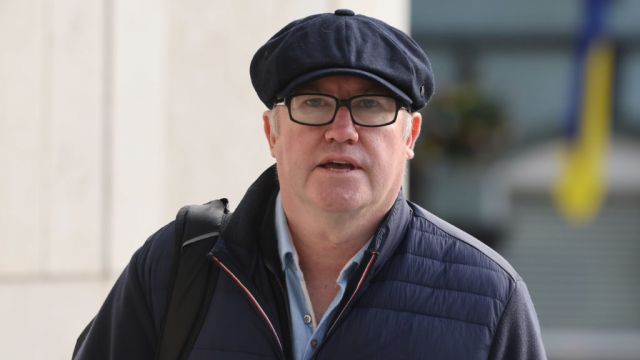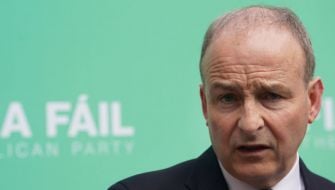A former employee of Anglo Irish Bank has told the trial of former solicitor Michael Lynn that he doesn't think the then chairperson of the bank, Sean Fitzpatrick would have had “intimate knowledge” of any one customer.
Mr Lynn (55), of Millbrook Court, Redcross, Co Wicklow is on trial accused of the theft of around €27 million from seven financial institutions. He has pleaded not guilty to 21 counts of theft in Dublin between October 23rd 2006 and April 20th 2007.
It is the prosecution’s case that Mr Lynn obtained multiple mortgages on the same properties, in a situation where banks were unaware that other institutions were also providing finance.
The financial institutions involved are Bank of Ireland, National Irish Bank (later known as Danske Bank), Irish Life and Permanent, Ulster Bank, ACC Bank, Bank of Scotland Ireland and Irish Nationwide Building Society (INBS)
David Casey, formerly a manager in the lending department of Anglo Irish Bank gave evidence on Thursday. He confirmed that the institution used external solicitors to perfect its security.
Mr Casey confirmed to Mark Lynam SC, defending, that he was not involved at the time but took over management of these loans at a later stage.
Loan refusal
He told Mr Lynam that it would have been “common practice” in any institution to refuse a loan where there was lending with other banks.
Mr Lynam put it to Mr Casey that this is his opinion. “I don’t think so. I think it’s a statement of fact,” he replied.
Mr Lynam noted that his client faces no charges in relation to Anglo Irish Bank and suggested that the prosecution will say Mr Lynn's intentions were “effectively scuppered” by the use of external solicitors.
Mr Casey said he didn't believe that Mr Lynn asked to use his own solicitors, but accepted Mr Lynn would have been aware of the bank's requirements as it had lent to him in 2005.
Mr Lynam told the witness that his client would give evidence that he had a “good personal relationship” with the then chairperson of Anglo Irish Bank, Sean Fitzpatrick, and he was aware of Mr Lynn's lending.
Mr Casey said he didn't know, but added, “I wouldn’t have thought the chairman [of the bank] would have had intimate knowledge of any one customer.”
Mr Lynam noted that the bank provided loans of €11 million to his client in one year. Mr Casey replied that was a “significant” amount of money, but it wasn't “unusual” or “high value” for the time.
He accepted that his answer was based on his sense of procedure, and he was “not aware” of any conversations between Mr Lynn and Mr Fitzgerald.
Mr Casey told prosecuting counsel a loan of €11 million during the period in question, while significant, “wouldn’t have stood out”.
Sean Alger, former head of commercial division at Permanent TSB, told Mr Finnegan that he was a member of the bank's internal credit committee, which approved a loan to Mr Lynn in May 2007.
Lending facilities
Mr Alger was taken through a mixture of documents, including credit committee memos and emails. He agreed that the memo of a credit committee meeting on May 30th 2007, stated that they approved two lending facilities of €3.72 million for residential investment and a €5.5 million commercial mortgage facility.
The memo stated that the bank had an existing exposure of around €4.9 million to Mr Lynn, meaning that these proposed new loans would bring the bank's total exposure to approximately €14 million.
Mr Alger agreed the €5.5 million loan facility was not necessarily for residential mortgage investment. The jury was told this loan for €5.5 million was never drawn down.
Mr Alger said the loans were approved on certain conditions, including the registration of a first legal charge over the particular properties.
Mr Alger told Mr Comiskey-O'Keeffe that he “absolutely” did not accept that he, his colleagues or the bank were negligent in its lending to Mr Lynn.
Mr Comiskey-O'Keefe noted that the jury had been shown an unsigned version of the credit committee memo, but Mr Alger told Mr Lynn's last trial that there is also a signed version.
The witness said he “expected” there was also a paper version of the memo, but wasn't familiar with the bank's processes for archiving records.
He told defence counsel he was not asked to take part in any internal investigation or audit about the bank's lending to Mr Lynn.
Personal lending discretion
Mr Alger agreed with Mr Comiskey-O'Keeffe that he could approve loans up to his “personal lending discretion” without escalating them to the credit committee. He said he thought he had authority to approve up to €2 million, but said he could not recall specifically. He agreed he had approved a loan of €1.9 million to Mr Lynn in 2005.
He told Mr Comiskey-O'Keeffe that he could not delegate his “personal lending discretion” to a credit assessor, nor could someone with a higher discretion delegate theirs to him. He said the structure around delegated authority was decided at board level.
Mr Alger said he was a member of the credit committee in 2007, which sat once a week, and its members were separate from the managers presenting a proposed loan for approval.
He outlined some of the issues considered by the credit committee, including creditworthiness and a borrower's repayment capacity.
Creditworthiness
He said the committee would assess a borrower's creditworthiness from a risk perspective using several factors. They would also consider any loans a borrower may already have with the bank.
Mr Comiskey-O'Keeffe noted that one of the conditions of a loan approved in April 2007 for €4.9 million was that his client had to clear an existing loan to the bank, but there was no specific undertaking in relation to this, suggesting the debt was cleared using another method.
Mr Alger said generally, the solicitor's letter of undertaking would include a requirement to discharge any outstanding debts, but he didn't know the details in this case.
Mr Comiskey-O'Keeffe put it to him that he was “mistaken” and there was no requirement in the solicitor's undertaking to clear outstanding debt. Mr Alger said he had worked in banking “for a long time” and was aware of the security process.
He agreed with Judge Martin Nolan that it was his understanding that part of the April loan was to repay an existing loan to Mr Lynn.
He said it would be an “obligation” on the borrower to fulfil the conditions of a loan approval. Mr Comiskey-O'Keeffe told Mr Alger that his client would give evidence that he took various loans from the bank between the late 1990s and 2005, some of which included conditions to repay earlier lending, but this wasn't done.
He said his client will say he met two bank officials before 2005 and challenged them on this condition. Rather than repay the loans, he “carried the payments”, and these two bank officials were aware of this situation.
Mr Comiskey O'Keeffe suggested that if an outstanding balance on existing loans should have been cleared “on two or three occasions in the past”, this should have been brought to the attention of the credit committee.
He put it to Mr Alger that the documents show that his client “did not have a good track record” as he had not complied with conditions to repay his earlier loans.
Mr Alger disputed this and said the loan documents show Mr Lynn was not in default on his earlier loans, but that these were incorporated into his later lending with the bank. He said the loan in April 2007 incorporated earlier lending of €1.9 million.
He agreed with Mr Finnegan during re-examination that it was not suggested to the credit committee that the loans to Mr Lynn were for another purpose, such as overseas property development.
He agreed and said the documents he was shown while giving evidence showed the facility was to purchase residential investment properties and to “clear existing debt”.
Mr Finnegan also showed Mr Alger an internal email between other bank officials from April 2007, which stated the redemption of an earlier loan for €1.9 million was delayed due to “confusion” in Mr Lynn's office, and he was “embarrassed and annoyed” by this.
Mr Alger said he couldn't recall if this email was disclosed to the credit committee at the time.
James Brady, assistant manager in Permanent TSB's financial crime and loss unit, confirmed to Karl Finnegan SC, prosecuting, that the bank received a court order earlier this year in relation to the bank's internal reports on its dealings with Mr Lynn in 2007.
He said he “checked the systems I had access to” but could not find any internal reports of this kind.
Mr Brady said he also instructed the bank's IT department to check for email correspondence between the bank and email addresses for Mr Lynn at Kendar between January 2007 and June 2008,
He said the IT department advised him they were unable to locate any email correspondence between the bank and these email addresses during that time period.
Under cross-examination by Paul Comiskey-O'Keeffe, Mr Brady said he checked the systems he had access to, including a database of file storage.
He said he didn't come across any information about an internal investigation and didn't know if this would generate an internal report.
Mr Brady said he didn't know if an internal investigation had taken place between the dates of the last trial and last February. He also confirmed that his search did not include looking to see if documents were given to third parties, including external solicitors involved in the bank's civil case against Mr Lynn.
Deirdre Byrne told Mr Finnegan she was working as a commercial underwriting manager in PTSB in 2007 and was involved in some of Mr Lynn's loan applications to the bank.
Mr Comiskey-O'Keeffe asked Ms Byrne about her delegated authority to approve loan applications. Ms Byrne said she would have a “lending limit”, and anything above this was escalated to someone more senior.
The trial continues before Judge Nolan and the jury.







